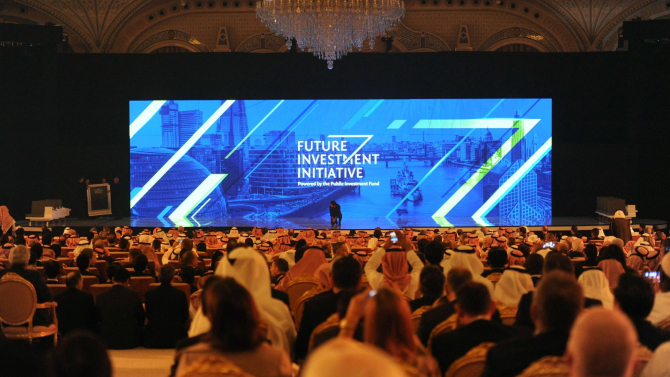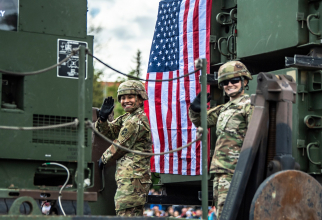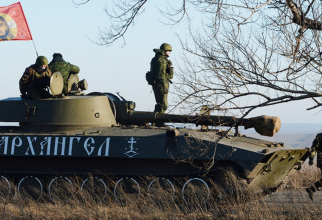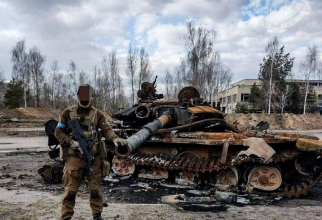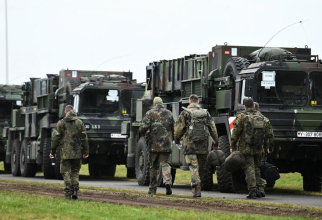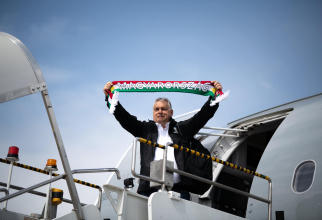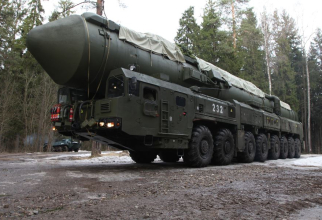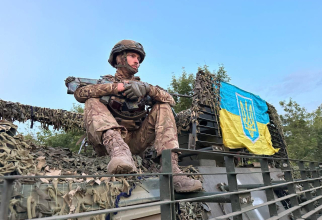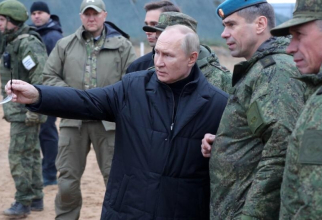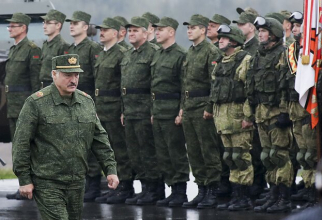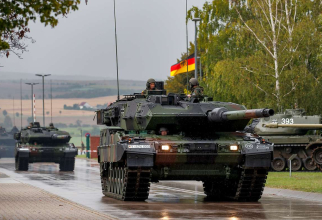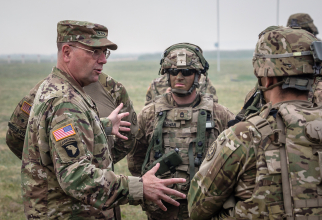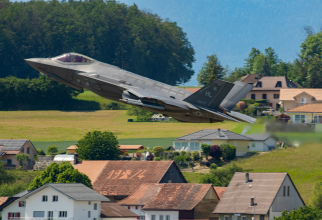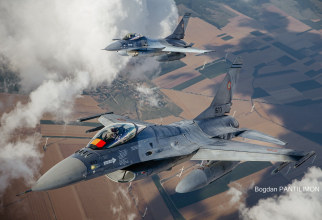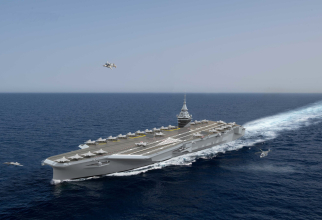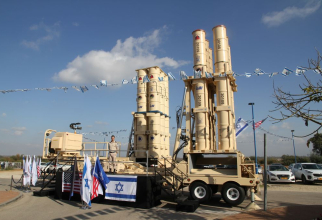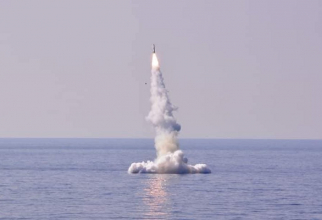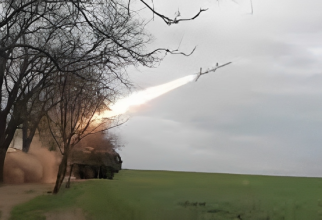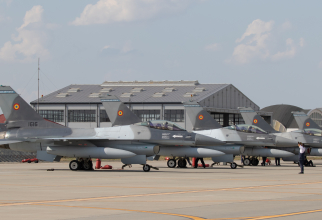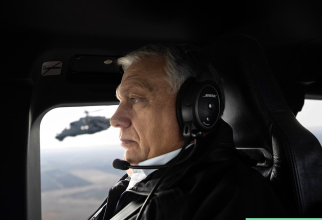Primim un amplu material de la partenerul nostru din Olanda, Cyril Widdershoven. Analistul VEROCY ne prezintă conferința "Davos în Deşert "(FII2018) şi rezultatele ei.
Conferința a avut loc pe fundalul imensului scandal Khashoggi şi a unei brutale campanii împotriva prințului moștenitor saudit Mohammed bin Salman. Cu toate acestea, analistul considera că FII 2018 a fost un succes incontestabil, mai ales în zona de interes a guvernului saudit. Deși Europa afacerilor pare a fi folosit drama Hhashoggi pentru a boicota conferinţă, la nivel înalt, totuşi contracte de 56 de miliarde de dolari au fost semnate. Defense Romania publică acest text care trebuie citit prin prisma marilor transformări pe care Arabia Saudită le cunoaște. Navigând intre provocări și ambiții, iată că Saudiţii cunosc şi ei modernitatea secolului XXI.
În ultimele trei săptămâni, viitorul Arabiei Saudite a fost pus la îndoială de toți mari lideri politici ai lumii. Descoperirea neașteptată, dar dramatică a uciderii jurnalistului saudit Jamal Khashoggi din Istanbul, Turcia, de către serviciile de securitate din Arabia Saudită a zguduit structurile de putere ale Riadului, amenințând puternic poziţia de lider a Prinţului Mohammed bin Salman. Mass-media occidentală și politicienii au evitat să încerce să prezinte o presiune politică comună asupra regelui din Arabia Saudită pentru a lua în considerare înlăturarea de la putere a lui Mohammed bin Salman.
Concentrându-se pe rolul pe care Mohammed bin Salman îl are în calitate de șef oficial al sectorului saudit de apărare și securitate, în uciderea abuzivă a lui Khashoggi, guvernele europene și politicienii americani nu numai că și-au arătat pozițiile personale, dar, în mod eficient, și-au subminat propria poziție de negociere în interiorul lumii. Fără a aștepta o analiză juridică independentă, liderii europeni au ales să se angajeze într-o frenezie anti-saudită, susținută de o scurgere continuă de date şi informaţii din surse din Turcia. Președintele turc Erdogan a preluat poziția de lider anti-saudit, nu numai că a lovit mult în Arabia Saudită prin discursurile sale, ci a încercat, în principal, să submineze poziția lui Mohammed bin Salman, care până atunci a fost văzut ca un tânăr gânditor reformist independent în lumea arabă .
În continuare redăm integral în limba engleză analiza lui Cyril Widdershoven, expert și fondator al think tank-ului Veroci, privind modul în care asasinarea jurnalistului saudit Jamal Khashoggi a influenţat conferința "Davos în Deşert" (FII2018).
Saudi’s FII2018 and Khashoggi, Circling the Wagons while looking East?
The last three weeks Saudi Arabia’s future has been questioned by all. The unexpected but dramatic outfall of the murder of Saudi journalist Jamal Khashoggi in Istanbul, Turkey, by Saudi security services has rocked the power structures of the Kingdom, threatening to bring down Crown Prince Mohammed bin Salman. Western media and politicians have been stumbling over each other trying to present a unified political pressure on the Saudi King to consider the removal of Crown Prince Mohammed bin Salman. By focusing on the perceived role of MBS, as the official head of the Saudi defense and security sectors, in the abhorrent murder of Khashoggi, European governments and US politicians not only have shown their personal positions, but most effectively have undermined their own negotiating position inside of the Arab world for the foreseeable future. Without waiting for an independent legal probe, European leaders chose to engage in an anti-Saudi media frenzy, supported by a continuous data leakage from Turkish sources. Turkish president Erdogan took over the anti-Saudi leadership position, not only to hit hard on Saudi Arabia as a whole, but mainly trying to undermine the position of MBS, who was until that moment seen as a young independently thinking reformist in the Arab world. The latter has changed dramatically, based on assessments in Western media.
The anti-Saudi frenzy, caused by the murder on Jamal Khashoggi, however did not really result in the objective, a low-turnout of attendees at MBS’s high-profile yearly investment meeting in Riyadh, the Future Investment Initiative 2018, also dubbed to be “Davos in the Desert”. In contrast to Western media reporting, FII2018 again showed a high-turn out, with around 3500 delegates, presenting the world’s largest investment funds and companies still.
Even that high-profile companies, such as Uber, Virgin, Blackrock or Siemens, pulled back their CEOs as speakers, high ranking representatives were still attending and flocking the rooms. At the same time, as was stated in the press, US Secretary Mnuchin also did not take the speaker’s chair, as a reaction officially to the ongoing Khashoggi issue. Mnuchin himself, in his official position, was however still in Riyadh, for discussions with the Saudi government on all US-Saudi issues pending, such as OPEC, oil prices and the Iran Sanctions implementation on November 4. European governments were the only ones not attending at all.
When looking at the business attendees, the most obvious difference with the 2017 version was the lack of high profile US companies ruling the rooms. The ongoing anti-Saudi media campaign, partly supported by the already existing anti-Riyadh front, and engaged by leading officials in Ankara, Washington, London and Doha, still took its effect. The call for a boycott of FII2018 was not followed by the overwhelming majority, but still, some Western officials, corporate executives and media bosses canceled their participation in the event. Saudi Arabia’s Crown Prince Mohammed bin Salman’s pet project seemed to be hit by a tsunami. This perception however was only generated in the Western media, as outlets in Russia, Asia and the most of the Arab world, refrained from this. FII2018 presented for most parties an irresistible event, as opportunities to participate in the ongoing diversification of the Saudi economy are too attractive and lucrative to ignore. Most also understood that taking part would later on be seen as very positive, refusing parties could be put on a grey-list, even that Saudi officials have refuted these claim.
At the same time, some of the negative media reports already were countered by financial assessments of the IMF, WB and others, showing that the Saudi economy is resilient and vibrant. In addition to the well-known oil and gas opportunities, or the high profile Giga Projects, other sectors have now taken the limelight too. High-tech manufacturing, fintech, infrastructure or aviation, are currently attracting increasingly higher levels of Saudi investments.
Based on its oil economy, Saudi’s overall economic growth potential is also strong. The last weeks international rating agency Moody's has raised Saudi Arabia's GDP growth forecast for 2018 to 2.5 percent from 1.3 percent, and it maintains a "stable outlook" for the Kingdom's economy. Moody’s predictions for 2019 are even higher, showing a 2019 GDP forecast of 2.7 percent, well above the 1.5 percent previously predicted. Economic and political challenges, as presented the last weeks, can still be weathered. Some possible corrective measures could also still be put in place if the global investment sectors are showing a fear to enter the Kingdom soon. It is however to be expected that the Kingdom will see a new influx of FDI as soon as it will be included in the FTSE and MSCI Emerging Markets Index.
Even that FII2018 was less shiny or showy, projects and contracts of around $56 billion were presented and signed. Around $34 billion worth of these projects were related to energy, refining and petrochemicals, including 12 "mega deals." Massive deals have been done with major players such as Trafigura, Hyundai, Norinco, Schlumberger and Halliburton. Remarkably enough, as even Saud Energy Minister Khalid Al Falih reiterated, the majority of all these multibillion projects were taken by US companies. At the same time, French oil and gas major Total showed its confidence in Saudi Arabia very clearly.
Outside of the FII2018 rooms, the effects of the media onslaught of the last weeks have been visible but were short lived. The Saudi stock exchange Tadawul showed several days of severe pain. However, price fluctuations, market volatility and retraction of international funds, should not be overestimated. When looking at the current Tadawul All Share Index (TASI) the overall situation is very positive. At present, TASI is more than 8% higher than at the same time last year. Optimism about the future is also presented by European attendees. A senior European banker said that while the Saudi image among some international bond investors had been damaged, investment patterns would probably return to normal in a couple months. “Business has a short memory,” he said.
In a reaction given by Mohammed Al Jadaan, Saudi’s Minister of Finance, the latter stated the overall status of the economy was very promising. Al Jadaan said that Saudi Arabia’s non-oil revenues jumped 48 percent to SAR 211 billion during the third quarter of 2018 compared to the same period last year. One of the underlying success factors for this is the fact that the ministry has managed to reduce the budget deficit from 16 to 9 percent last year. He expected at the beginning of this year the deficit to reach less than 7 percent.
Saudi future depends on regional constellation?
Still, now the dust has settled of the FII2018, and Riyadh’s rulers and investors are able to get back to business, the question remains what will be the effect on Saudi Arabia’s future? After three years of a dramatic public relation campaign, in which the Kingdom was presented as a new vibrant and shining light in a region full of instability, religious and military strive, some features have changed dramatically. The Khashoggi murder has removed the Golden Halo that was put by the media and analysts on the Young Prince of Riyadh, Crown Prince Mohammed bin Salman. The stellar rise in power, and the extremely high targets set by MBS for the future of Saudi Arabia in Saudi Vision 2030, attracted the high and mighty of the world. Last year’s list of celebrities attending FII2017, including former French president Sarkozy or former British PM Tony Blair, were hitting the front pages of all newspapers, magazines and TV channels. MBS was surrounding by VIPs, rulers and financial merchants of this century. If success could rub off, MBS’s clothes would have been in shambles after the former FII. The shine of gold and success, also presented by the immense multibillion dollar Giga Projects, such as NEOM or Qiddiya, was breathtaking. Success after FII2017 was there, but not yet as high as expected or promised during the “Davos in the Desert” November 2017. Analysts already expected a new Las Vegas approach, while some worried FII2018 would be disappointing. Both however have been wrong.
The Khashoggi crisis, and the absence of several hotshots in Riyadh, has not resulted in the demise of all. The more down-to-earth approach of FII2018, showing only real projects and feasible strategies, has presented a new life-line for Saudi Vision 2030. Success can now be measured in real terms, not based on dreams and futuristic predictions without factual presence.
At the same time, FII2018 has shown to the world that the position of Crown Prince Mohammed bin Salman has been shaken, but remains to be build on a strong footing. The obvious Circling the Wagons approach shown by Saudi Arabia’s staunchest supporters has given enough new blood to the Crown Prince to not only withstand the storm still brewing but also to retain the upper-hand inside of the Kingdom. A full Arab front of young leaders, made up of King Abdullah II of Jordan, Bahrain’s Crown Prince Salman bin Hamad bin Isa Al Khalifa, Lebanese Prime Minister Hariri and Dubai’s Ruler Sheikh Maktoum, has shown that the majority of the Arab leaders are behind MBS as Crown Prince of Saudi Arabia. The Western anti-MBS rhetoric is currently seen by GCC Arab countries as an “Indian” war cry war, forcing the “Cowboys” to circle their wagons. Even that the pressure will be on MBS to change some of his current strategies, due to the continuing criticism vented by Western officials and media, the open support shown by Saudi’s GCC compatriots is a clear message. “MBS time is still not over”, Saudi Arabia will be progressing along the lines of MBS and the current people in power.
Western analysts and media, on which politicians in Washington, London, The Hague, Brussels and Berlin, are basing their strategies and policies on, are clearly out of touch with the dynamics currently in place in the Kingdom and the Arab world. Lessons that should have been learned from the total collapse of the Arab Spring, and the perceived democratization movements, should have been taken into account. The Middle East and North Africa are not the same playing field as Westerners have been used too. New leaders have emerged, with autocratic tendencies but still trying to push their countries forward into the 21st Century. Economic diversification is taking place, while geopolitical alliances have been thrown overboard. To count on Western influences in the Arab World, based on historical ties and military cooperation, seems to be currently wishful thinking. After the Arab Spring, which resulted in still ongoing civil wars in Syria, Libya and partly Iraq, while Egypt and Bahrain have either withstood the onslaught or returned to their former political-military rule, a new confidence and regional geopolitical realism has emerged and entrenched into the minds of the young rulers. The failure of Western military-political interventions the last years, confronted by a re-emerging Russian and Chinese influence in the region, has given Arab rulers and royals the opportunity to chop and change sides at will. FII2018 is just another example of the current restructuring of power in the region. Western political and economic pressure, even threats of sanctions on military exports and financing to the Kingdom, has been met by a young prince able to choose his own path. The fact that Western parties refused to attend the conference was met by invitations to Russian, African and Asian parties. Still empty seats have been filled by officials and companies from the GCC and Egypt.
MBS, supported not only by his inner circle, made up of Khalid Al Falih, Al Jadaan and others, but also by GCC royals and others, has been able to quell the threats to his power within days. The idea pushed by Western officials that they could force Saudi King Salman to remove his son as Crown Prince shows the lack of knowledge and inside into the House of Saud. The main issue is that Saudi Arabia is a Kingdom, not a constitutional monarch, but an old fashioned King, who holds onto his powers based on a family ruled power structure. The Crown Prince is an integral part of this move by King Salman. The last years have shown that MBS is more than able to put his own power base in place, while removing any possible opposition in- and outside of the Royal Family, Royal Court or military. MBS will be for the foreseeable future be the main power broker in Riyadh, expanding his current network and links on the global scene. If Washington, the EU and other Western players, want to have a say in Riyadh, and indirectly Bahrain, UAE, Egypt or Jordan, a trip to Riyadh is still a necessity. Sanction threats or direct calls for changes in the government are very ineffective. After the first diplomatic political uproar, which resulted in the cancellation of a list of trade delegations from European countries, together with a call by Canada and Germany to end arms exports to the Kingdom, already have been shown to futile. A combined European arms embargo will not happen, as French president Macron has made clear the last days. The French president has openly criticized Germany and others by stating that there is no link between the Khashoggi murder and arms exports. Norway, an European outsider but known to be very supportive of CSR and Human Rights issues, has also stated that its sovereign wealth fund will be increasing its investments in Saudi Arabia the coming months, in stark contrast to other Western countries.
The last days it has become clear. The “Indian” onslaught, led by the European version of Geronimo and Cochise, has already been met by an Arab version of John Wayne. The Circling of the Wagons has also not even been able to be crushed by the Ottoman forces, led by Erdogan. The latter’s continuing trickling of damaging facts has been hurting Saudi Arabia a lot, but not destabilize or remove MBS. As every farmer knows, when you are milking a cow too long, the latter will be kicking back very hard. Seems that this has happened already as the milk source has dried up lately. When looking at MBS’ current position, he is a vivid fan of John Wayne. Looks he has a book full of quotes on his desk already.
As John Wayne did not yet know the Saud internal politics, it is rather interesting to see that this could be written for the Saudi power play. Showing weakness is the first step to failure.
Fii primul care află cele mai importante știri din domeniu cu aplicația DefenseRomania. Downloadează aplicația DefenseRomania de pe telefonul tău Android (Magazin Play) sau iOS (App Store) și ești la un click distanță de noi în permanență
 Fiți la curent cu ultimele noutăți. Urmăriți DefenseRomania și pe Google News
Fiți la curent cu ultimele noutăți. Urmăriți DefenseRomania și pe Google News



